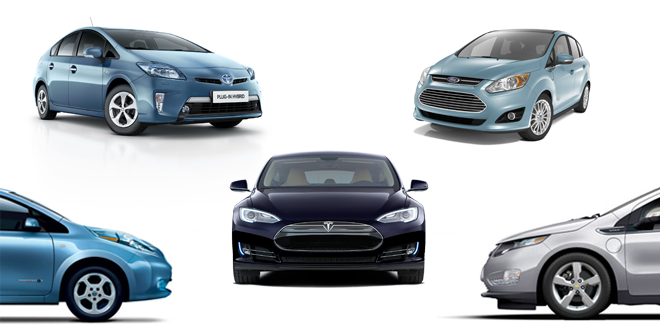It was a banner year for plug-in vehicles, as 2013 sales (94,019) almost doubled 2012’s figure (52,581), and several new models made strong debuts – US buyers now have a choice of 16 mainstream plug-in models, compared to 9 at the end of last year. Overall US auto sales are up 8% in 2013, according to AP.
The Chevy Volt was the winner for the year, selling 23,094 units. However, that was a slight decrease from 2012 sales of 23,461. Running a close second was the Nissan LEAF, which posted by far the best increase in sales: 22,610 in 2013, compared to 9,819 in 2012.
Although Charged, like most other EV media outlets, has a lot of fun following the monthly sales figures, we don’t believe they mean much in the larger scheme of things. Seasonal market variations and supply-chain issues can make those figures fluctuate wildly. To get any sense of long-term trends, one needs to look at yearly sales, and only the Volt, the LEAF and Mitsubishi’s hapless i-MiEV have been on the market for two full years. Despite what the naysayers continue to insist, it is still early, early days for the automotive revolution.
However, a couple of trends seem clear. Volt and LEAF have settled into fairly consistent sales of about 2,000 per month, and they will continue to share the lead for the near future. This is unsurprising: they’ve been on the market long enough for their makers to get the supply and sales channels well organized, and GM and Nissan have devoted substantial resources to marketing them. The fact that these two very different models are running neck-and-neck shows that there are equally strong markets for PHEVs and pure electrics.
Speaking of pure electricity, Tesla’s Model S (in third place for 2013 with sales of 17,650, according to InsideEVs’ estimates) is in a class by itself. The glamorous EV standard-bearer has become a pop culture icon – it’s been mentioned in the New York Times crossword, South Park and a handful of ads for unrelated products. Deliveries outside the US have just begun, and Elon Musk has predicted yearly sales of around 40,000 (half of that in North America) for the foreseeable future.
Firmly in fourth place is the Toyota Prius Plug-in, which sold 12,088, failing by a whisker to beat its 2012 sales of 12,750.
Ford’s plug-ins are cruising along nicely. Its C-MAX Energi and Fusion Energi secured respectable fifth and sixth place finishes for the year. The Ford Focus Electric was the third-best-selling pure EV in 2013, with well over 1,500 sales.
There are several other plug-ins on the market – Mitsubishi i-MiEV, Toyota RAV4 EV, Honda Fit EV and Accord PHEV, Smart ED, Chevy Spark EV, Fiat 500e – that have been disappointments (from our point of view), and most months we don’t even bother reporting their handfuls of sales. We’ve driven several of these, and read glowing reviews of most, and we can tell you that they aren’t languishing because they’re bad cars. They aren’t selling because their makers aren’t marketing them. While this may seem odd to an outsider, in the auto industry it’s not at all unusual, and it may even be a sound business decision (it must also be said that most of these automakers are producing plug-in models only because the government of California forced them to). We don’t expect to see any of these models report substantial sales in the year ahead.
The biggest story of early 2014 will be the BMW i3, which is already on sale in Europe and should hit US showrooms in April. It’s a native EV (not a conversion of an ICE model) that targets a promising niche at a reasonable price point. Most importantly, BMW seems quite serious about selling it.
Also coming down the pike in the new year: the Porsche Panamera S E-Hybrid and Cadillac ELR, both of which have just gone on sale; and the Mercedes Benz B-Class Electric Drive, which is promised for late summer.
Source: InsideEVs, AP

















































